MGUG
Awards
The Manitoba GIS User Group (MGUG) is dedicated to recognizing and celebrating the outstanding contributions of individuals and teams within the geomatics community and exceptional students using GIS to transform our world. Our awards program includes the
Celebrating Contributions to GIS
The MGUG Awards honor those who have demonstrated exceptional skills, innovation, dedication and commitment to advancing GIS and geospatial knowledge within Manitoba and the users of geospatial information. These awards not only highlight individual achievements but also emphasize the collaborative efforts that drive our field forward.
From service recognition to transformative projects and exceptional student initiatives, we take pride in shining a spotlight on the stories of those who go above and beyond to create positive change through our awards.

GIS Service Recognition Award
*(formerly Lifetime Achievement Award)
Celebrates individuals who have made significant contributions to the geomatics community.
Recognizes long-term dedication and leadership in GIS practices.
Acknowledges innovative solutions that enhance geospatial technology.

Outstanding Project or Team Award
Honors collaborative efforts that lead to impactful GIS applications.
Highlights projects that have made a measurable difference in communities or industries driving technological advancement.
Recognizes excellence in project execution and management within the geospatial domain.

Education Awards
Bimal Adhikari Award in Applied GIS- demonstrates technical and/or applied use of GIS for a specific problem or task.
Janos Boda Award in Research GIS- demonstrate use of GIS within a larger research project.
Past Award Recipients
The MGUG GIS Service Recognition Award (formerly Lifetime Achievement Award)- Given to an outstanding individual in Manitoba who has made significant contributions to the geomatics community and is awarded at the Annual Fall Conference.
• Demonstrated exceptional service / leadership over a significant period of time.
• Displayed a wisdom, depth of service, and passion that has made a significant difference to individuals or groups.
• Exemplified the core values of Integrity and Respect through their interaction with colleagues and the community.
• Promoted excellence within the geomatics industry.
• An outstanding active individual contributing to improving the work and users of the GIS community.
Lifetime Achievement Award Recipients:
2024 – No Submissions
2023 – Antonio Viveiros
2022 – John Teillet
2021 – Greg Carlson
2020 – Brian McGeagor
2019 – Lindsay Donnelly
2018 – Bob Bruce
Given to an outstanding GIS Project completed in Manitoba or by a resident of Manitoba, or to an outstanding active GIS Team contributing to improving the GIS Community. This award is given at the Annual General Meeting.
Outstanding Project or Team Award Recipients:
2024 – No Submissions.
2023 – Volatus Aerospace & University of Winnipeg – Detecting Spectral Signatures of DED Infected Trees Matthew Johnson- Volatus, Jovanny Sanchez, Jenelle Ehn, Dr. Richard Westwood- U of W.
2022, 21, 20 – No Submissions.
2019 – Manitoba Hydro – GIS Based Data Collection & Management of Hydro’s Pole Maintenance Program.
2018 – First Place:
• Conservation Officers Reporting Application Jack Harrigan and Colin Merritt, Conservation Officers Service Tanya Dixon, Derrick Ko Heinrichs, Jocelynn Johnson, GeoManitoba.
Second Place:
• AgriMaps: Current Weather Conditions, Hailey Wright, Manitoba Agriculture.
Our education awards recognize the outstanding achievements of individuals who have demonstrated exceptional skills, innovation, and dedication in advancing geospatial knowledge. From groundbreaking research to transformative applications, we celebrate those who are shaping the future of geospatial technology through their commitment to excellence in education.
Educational Award Recipients:
Bimal Adhikari Award – Demonstrates technical and/or applied use of GIS for a specific problem or task
2024 – Shirmith Kuruppu Arachchige Don, U of M Using UAV based Remote Sensing to Assess Crop-Weed Competition under Integrated Weed and Nutrient Management Practices.
2023 – Lauren Sheedy, U of M Moving to the City: Housing Resources & Services in Winnipeg.
2022 – Parinaz Shariat Zadeh, U of M Moving forward: sustainable transportation strategy.
2021 – Jami Cameron, U of W Snow depth detection using MSS UAV images.
2020 – No award due to COVID-19.
2019 – Jocelynn Johnson, BCIT Using Survey 123 and GIS technologies to track and protect Cetacean species in British Columbia.
2018 – Anton Metalnikov, U of M Downtown Winnipeg Mapping and Documentation.
2017 – Japandeep Sethi, U of M Patterns of Burn Injuries in Winnipeg Manitoba: A Population Health Study
2016 – Trevor Johnston, RRC The Effect of Growing Degree Days on Walleye in Manitoba: A Look at Current and Predicted Effect.
Janos Boda Award – Demonstrate use of GIS within a larger research project
2024 – Lamia Mahzabin, U of M Hazard Index and Potential Cancer Risk of Heavy Metals in the Groundwater of
Bangladesh.
2023 – Amanda Belanger, U of M Use of satellite imagery to estimate distribution and abundance of Cumberland.
2022 – Sean Johnson-Bice U of M A cosmic view of ‘tundra gardens’: satellite imagery provides a landscape-scale perspective of Arctic fox ecosystem engineering.
2021 – Ajarat Adegun, U of M Higher COVID-19 Rates in Manitoba’s First Nations Compared to Non-First Nations Linked To Limited Infrastructure on Reserves.
2020 – No award due to COVID-19.
2019 – Veronica Wojtuszewska, U of M On the Importance of Language: Reclaiming Indigenous Place Names at Wasagamack First Nation, Manitoba, Canada.
2018 – Jeffrey Plett, U of Calgary Analysis of Land Classification Methods to Identify Wetlands in Riding Mountain National Park Using an Automated Workflow.
2017 – Marshall Birch ,RRC Chimney Swift Nesting & Roosting Site Selection: Factors Within Manitoba Populations.
2016 – Paige Kowal, U of M A historical analysis of changes in emergent plant cover in Netley-Libau Marsh: untangling the effects of Lake Winnipeg hydrology and Red River connectivity.
